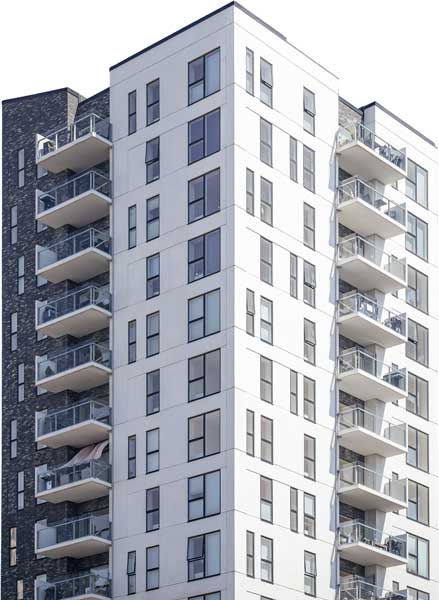A delay in the off-plan purchase?
6 points to validate
Written by Me Zakine, Doctor of Law, VEFA Lawyer.
Sommaire
Maître Zakine, Doctor of Law, Lawyer and Lecturer at the University of Law in Nice, deals with VEFA issues on a daily basis. She deals with dozens of cases throughout France and meets with numerous developers.
In this article, she discusses three main questions: When can we talk about late delivery in VEFA and what are the texts that apply.
I/ When can we talk about late delivery of a vefa?
The VEFA or Vente en état de futur achèvement, is a sale based on plans for the purchase of a property (house or flat) to be delivered within a specified period.
The seller/developer remains the owner of the construction until delivery of the units, at which point ownership of the property is transferred from the owner to the purchaser.
He is assisted by a project manager who will carry out the construction.
The buyer does not pay the full amount of the purchase in one go. Regular calls for funds are made according to the progress of the construction project. The project manager sends a progress report on the construction site and the owner sends a provisional call for funds at the start of each new stage in the construction.
Very often, future owners of real estate acquired off plan, that is to say as part of a sale in a state of perfect completion, are faced with delivery delays which they have had difficulty coping with: management of real estate credit, rent to be paid while awaiting delivery, parking space to rent while awaiting delivery.
When customers come consult a lawyerIn some cases, the delay is already very serious.
It should be noted in this respect that it is from the 30th day of late delivery, without justification from the developer, that the buyer can claim compensation.avocat retard vefa Whether it is on Bordeaux late delivery in vefa bordeaux
sometimes show non-compliance.

Article L 261-1 of the French Construction and Housing Code sets out the essential characteristics of a VEFA contract the obligation to build the property sold within a specified period.
Article L. 261-11 of the same Code states:
"The contract must be concluded by authenticated deed and must specify :
a) Description of the property or part of the property sold;
b) Its price and the terms of payment;
c) The delivery time ".
If one considers that the delay must be taken into account in relation to the planned delivery date, it is clear that in many cases there was already a difference between the delivery date provided for in the delivery contract and the one finally specified in the deed of sale.
Buyers are often informed of the postponement of delivery only when the sale is confirmed by a notarial act.
It is usually very easy to deduce from the analysis of the documents that the developer was already aware of the delay at the time of signing the reservation contract.
The Court of Appeal generally confirms non-conformity following a purchase agreement
Especially if, in the context of a collective action by several purchasers, the reservation contracts were signed at different times, cross-checking the information reveals that the developer deliberately withheld this information.
This leads us to conclude that the delay is aggravated by the bad faith behaviour of the promoter.
Not only was the consent of the purchasers vitiated at the time of signing the reservation contract, but the causes of the delay are hardly justified.
The role of the lawyer is to assist you.
If the purchaser is considered a consumer, he or she benefits from the increased protection afforded by the Consumer Code.
Indeed, Article L. 111-1 of the Consumer Code states that :
"Before the consumer is bound by a contract for the sale of goods or provision of services, the trader shall provide the consumer with the following information in a legible and comprehensible manner
1° The essential characteristics of the good or service, taking into account the communication medium used and the good or service concerned ;
2° The price of the goods or service, pursuant to Articles L. 112-1 to L. 112-4;3° If the contract is not to be performed immediately, the date or period within which the trader undertakes to deliver the goods or perform the service.
Moreover, Article 1112-1 of the Civil Code provides that 'the party who knows information whose importance is decisive for the consent of the other party must inform him of it if the latter is legitimately unaware of this information or trusts his contractual partner'.
The promoter is in fact bound by an obligation to provide information (Cass. 3e civ., 13 January 1982, no. 80-14.446, JCP G 1983, II, no. 20026) which the judges sanction when it has not been implemented in a loyal manner.
In addition to the information required by the compulsory terms of the contract for the sale of a building, the seller of a building also has a duty to provide information, and even cooperation, to help the purchaser understand and assimilate the mass of technical documents and specifications.
When a lawyer takes up the case on the grounds that the purchasers' repeated reminders have remained unanswered and ineffective, the lawyer demands proof of the delay.
The developers then hide behind the legitimate causes for postponement or the legitimate causes for suspension specified in the deed of sale:
- bad weather in the sense of the regulations governing work on building sites: bad weather conditions most often disrupt building sites: flooding, extreme cold, rain during the structural work phase can justify a delay. On the other hand, once the building has been rendered watertight and airtight, the developer can no longer cite bad weather as a reason for the delay,
- the recovery or judicial liquidation of the or of one of the companies carrying out the work or their suppliers,
- delays attributable to concessionary companies (Enedis etc.),
- delay in delivery of materials by suppliers,
- theft, damage, malicious acts or accidents on the site,
- discovery of archaeological remains,
- failure of a company placed under judicial supervision or in compulsory liquidation
The above list is not exhaustive.
However, the causes of delay must be clearly justified and not be the result of bad faith on the part of the builder, which would lead to a significant imbalance between the parties involved, namely the trader and the consumer.
However, more often than not, the developer simply gives the reasons for the delay and not the supporting documents, and when the latter are produced, their veracity is sometimes questionable: failure of a company, weather conditions, connection to ENEDIS, problem with the planning permission, etc. The reasons for the delay are often given by the developer. buildThese are causes that are invoked in most cases, but they should be analysed with particular care.
The promoter may double the days of justified delay but only if this is contractually agreed.
The Court of Cassation does not consider this clause to be abusive and has validated it on several occasions.
Also, since the developer is making recurring calls for funds, it is not acceptable that the purchasers are not aware of the causes of the delay that was announced to them and that they do not have access to supporting documents.
As the reservation contract and the deed of sale are synallagmatic contracts, the contractual commitments arising from them must be reciprocal.
It would therefore be unfair for everything to be placed on the purchaser when he or she suffers a delay which will, in most cases, result in damage.
II/ What to do in case of delay in VEFA?
It should also be noted that when buyers consult a lawyer, it is because the expected delivery date has been postponed.
However, clients should be asked whether this new date seems plausible or whether they consider that the delay will worsen as the construction progresses.
The analysis of the documents will determine the strategy of the case.
It is at this point that the developer can be asked, by means of a formal notice letter, to confirm the new provisional delivery date and to provide all the documents justifying the alleged delay.
It is also in this same letter that the absence of communication, justification, and attestation of delay from the project management is deplored.
Either the promoter responds and an amicable solution can be found or the promoter stands his ground.
A memorandum of understanding will be signed and the purchaser will obtain compensation and avoid a long and costly procedure.
It should be noted that very often, promoters only become aware of the value of negotiation once the legal action has been initiated and they have been able to familiarise themselves with the arguments and claims of the purchaser.
It is at this point that they realise the value of negotiating and finding a compromise solution.

In addition, we can consider that the delay is no longer admissible after 6 months of delay from the planned delivery date, especially when an earlier date was foreseen in the delivery contract and was postponed.
The delay is further compounded by the lack of clear and transparent information.
It is in this context that a legal action will be brought before the judicial court of the place where the building is located.
Read a real case in VEFA treated by Me Zakine
Extract: " "There is no communication. The promoter does not respond to my emails and letters of formal notice. "In any case, I re-read the contract and the promoter is within his rights. There is a clause that allows him to justify his delay. are the classic phrases I hear most from the promoter and the clients.
III / Which article of the law concerns late delivery of VEFA?

It will be possible to claim damages in the context of an action for liability of the promoter based on his fault, the absence of good faith in the performance of the contract and even before the signing of the contract, whereas Articles 1102, 1103 and 1106 of the Civil Code require the good faith of the co-contractor in the performance of a contract which is binding on the parties and imposes reciprocal contractual obligations on all parties.
This action seeks compensation for the damage suffered as a result of the delay:
- Economic damage: rent, parking space, interest on mortgage, storage etc. ....
- Non-material damage
- Rental damage: in the case of an acquisition in the context of a rental investment or in the case of the impossibility of selling the first property because of the delay.
It is of course following an attempt at conciliation or mediation, i.e. after an attempt at amicable resolution of the dispute proposed in the first letter of formal notice, that the action is brought before the courts, if it fails.
It should be noted that the magistrates very strictly assess the behaviour of the promoter and severely sanction his bad faith.
The legal and jurisprudential bases :
Article 1611 of the same Code specifies that "in all cases, the seller must be ordered to pay damages, if the buyer suffers prejudice as a result of the failure to deliver the goods at the agreed time".
If the delivery time is not respected, and if this is attributable to the seller and not to the purchaser (Cass. 3e civ., 5 July 2011, no. 10-30.767), the purchaser may claim damages for the delay in delivery. damage suffered under article 1611 of the Civil Code (Cass. 3e civ., 1er févr. 1999, n° 97-16.578; Cass. ch. mixte, 6 oct. 2006, n° 04-17.070; 3e civ., 14 mars 2012, n° 10-28.714).
Article 1231 of the Civil Code specifies that "unless the non-performance is definitive, damages are due only if the debtor has previously been given notice to perform within a reasonable time".
Moreover, Article 1231-1 of the same Code provides that 'the debtor shall be ordered, where appropriate, to pay damages either for the non-performance of the obligation or for the delay in performance, if he does not justify that performance was prevented by force majeure'.
Thus, if the project owner, when given formal notice, has failed to fulfil its obligation to deliver the work within a reasonable time, it is likely to incur liability (Cass. Civ. 3rd, 16 March 2011).
As a result, the seller's failure to inform the buyer of the delay constitutes a fault that may give rise to a right to compensation, even though the existence of particular circumstances would justify the suspension of the contractually agreed time limit (Civ. 3e, 29 March 2018, no. 17-14.249).
As part of the loss suffered, the purchaser may hope to obtain payment of the sums he or she has had to spend on accommodation or, if the property was intended for rental, compensation corresponding to the loss of opportunity to receive rent (Versailles, 24 Oct. 2016, no. 13/05508).
He may also seek reimbursement of the interest due on the interim period, the sums incurred in respect of insurance contributions, compensation for non-material damage (Bordeaux5 Jan. 2017, no. 15/03204) and the loss of a tax advantage (Toulouse, 6 July 2015, no. 13/02884).
IV/ Requesting the cancellation of the sales contract instead of compensation in the form of damages?

Delayed delivery of a VEFA property justifies the judicial resolution of the contract as well as the lapse of the loan taken out with a financial institution.
This was stated by the Paris Judicial Court in a judgment of 14 December 2021 (TJ Paris, 14 Dec. 2021, n°19/07687).
In this decision, the judge recalled the principle of the binding force of the contract between the parties (Article 1103 of the Civil Code) and the fact that the termination of a contract may result from a sufficiently serious contractual non-performance (Article 1224 of the Civil Code).
In addition, based on the provisions of article 1601-1 of the Civil Code, the judge held that the essential obligation of a VEFA contract is the construction of the property within a period determined by the parties and set out in the contract.
This means that :
- legitimate reasons for postponing delivery are not always accepted by the judge, who will check and analyse the circumstances of the case and the attitude of the developer,
- too great a delay cannot be accepted by the judge, who does not hesitate to sanction the promoter.
The main principles of contract law (good faith in the signing and performance of the contract, loyalty, obligation to provide information, reciprocal contractual commitments) are very much appreciated by the Magistrates.
IV/ A similarity between VEFA and CCMI
Finally, it should be noted that the issue of late delivery of the property also applies to contracts for the construction of individual houses (CCMI).
The same strategy is then applicable:
- Record of delay,
- Letter of formal notice
- Attempt at conciliation
- The case is taken to court if conciliation fails or if the promoter does not respond.
Cécile ZAKINE is at your disposal in the event of delay and offers you rigorous support, from the formal notice letter to the introduction of legal action, including amicable dispute resolution methods.
Read a real case in VEFA treated by Me Zakine
Extract: " "There is no communication. The promoter does not respond to my emails and letters of formal notice. "In any case, I re-read the contract and the promoter is within his rights. There is a clause that allows him to justify his delay. are the classic phrases I hear most from the promoter and the clients.
Master Zakine is a VEFA lawyer and in CCMI
She consults and works throughout France.
(video, electronic signature, online payment)
.
The firm adapts to the schedules of working people.
Master Zakine, Doctor of Lawa lawyer, is involved in VEFA delays (covid or not).
The law firm has expertise in VEFA delay actions.
A VEFA problem?
Maitre Zakine, lawyer, Doctor of Law, is a lawyer practicing VEFA on a daily basis.
His regular practice of construction law applied to VEFA and CCMI will help you through the process.
Contact her for an initial consultation.



